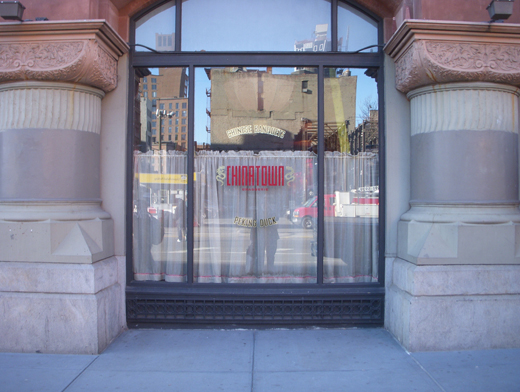Archive for February, 2009
Weekend Update (Friday Edition): Clearance
Friday, February 27th, 2009There are people who would never have accumulated the stuff that has piled up in our apartment over the years. I envy them.
It’s not that there wouldn’t be fifty times as much stuff if it weren’t for regular culls. But culling has never meant keeping the increase to zero. Until now.
Guess what I found! (more…)
Daily Office: Thursday
Thursday, February 26th, 2009¶ Matins: It’s impossible to be cynical about the story of Ivan Cameron, even if his death makes his father the next PM.
¶ Lauds: A show that’s as much about the history of taste as it is about “art”: Cast In Bronze: French Sculpture from Renaissance to Revolution. In other words, a little bit of Mannerism and a lot of Bourbon. Quatorze and I went to a preview this evening, and found it all very haut de gamme. The number of objects on loan from HM the Queen was astonishing until we remembered what a fool the Prince Regent was about snapping up post-revolutionary bargains — and mounting them on gilt bronze.
¶ Prime: If Father Tony would just make a greeting card out of his fantastic bit of photoshopping (I’m sure that he uses some other software; hence the lower case), I’d buy boxes. I didn’t even watch the speech, but the photos in the Times made me feel the same.
¶ Tierce: I try to learn something new every day, but I don’t expect to be as surprised as I was by a story in the Times according to which
Drug gangs seek out guns in the United States because the gun-control laws are far tougher in Mexico. Mexican civilians must get approval from the military to buy guns and they cannot own large-caliber rifles or high-powered pistols, which are considered military weapons.
¶ Sext: The next time someone claims to have sighted a unicorn, don’t laugh.
¶ Nones: As if the situation in Pakistan weren’t godawful, Bangladesh is experiencing a mutiny among its “Rifles,” as the Border Guards are known.
¶ Vespers: A new algorithm not only identifies the oldest words in the English language, but predicts which ones are mostly likely to slip into obsolescence.
Meanwhile, the fastest-changing words are projected to die out and be replaced by other words much sooner.
For example, “dirty” is a rapidly changing word; currently there are 46 different ways of saying it in the Indo-European languages, all words that are unrelated to each other. As a result, it is likely to die out soon in English, along with “stick” and “guts”
¶ Compline: Is there ever a good time for the academic humanities? “In Tough Times, the Humanities Must Justify Their Worth.” An impossible demand; for studying the humanities is priceless.
(more…)
Morning Read: About Quixote
Thursday, February 26th, 2009¶ On a whim, I read through to the end of Part I of Don Quixote this morning. Busy evenings and late hours left me wanting to spend time with just one book, and only four chapters remained. I was curious to see what Cervanted originally intended as an ending to his mocking epic.
Although I’ve been very amused by Don Quixote, and keenly interested in its dramatic foreshadowings of the comic opera of the Eighteenth Century, I have never once felt the rustle of greatness in its pages, and I’m far more sympathetic than I was, before opening the book, to the generations of Spanish readers who failed to recognize it as their national classic. Cervantes appears to have two fundamentally incompatible objectives in mind. He wants to entertain his readers with comic situations, but he also wants his entertainment to embody a critical analysis of popular literary forms. In one of today’s chapters, the canon and the priest engage in a leisurely discussion of the current theatre scene that betrays Cervantes as a very inexpert ventriloquist. Not for the first time, the narrative forgets about its hero (caged, at the moment) and gives way to the language of the treatise.
It would not be a sufficient excuse to say that the principal intention of well-olrdered states in allowing the public performance of plays is to entertain the common folk with some honest recreation and distract them from the hurtful humors born in idleness, and since this can be achieved with any play, good or bad, there is no reason to impose laws or to oblige those who write and act in them to make plays as they ought to be because, as I have said …
Far more troublesome than the story’s shambolic structure is its failure to bring Quixote himself alive, at least for me. This, again, seems to be the result of conflicting conceptions of his character.
The canon looked at him, marveling at the strangeness of his profound madness and at how he displayed a very find intelligence when he spoke and responded to questions, his feet slipping from the stirrups, as has been said many times before, only when the subject was chivalry.
I myself don’t marvel, but I do squint and scratch my head. In the end, I’m comforted by Jane Smiley’s claim, in 13 Ways of Looking at the Novel, that the “second volume is vastly more literary than the first.”
In the Book Review: On the Beach
Wednesday, February 25th, 2009Whatever you do, be sure to click through to David Orr’s essay, “The Great(ness) Game,” in this week’s issue. It offers what I feel is a long-overdue explanation of the shift, in American poetry, away from the “great literature” canons of verse and the antic hiving of today’s poetry scene. What’s needed is not so much a change in the way poetry is written — that will always see to itself — as a change in the way it is written about in publications such as the Book Review. All too often, poetry is reviewed by and for other poets. This kind of professional backscratching (which makes TLS just about useless) has no place on the general reader’s reading table.
Daily Office: Wednesday
Wednesday, February 25th, 2009¶ Matins: Although I haven’t parsed President Obama’s joint-session speech, I hail his fundamental premise:
Now is the time to act boldly and wisely — to not only revive this economy, but to build a new foundation for lasting prosperity. Now is the time to jumpstart job creation, re-start lending, and invest in areas like energy, health care, and education that will grow our economy, even as we make hard choices to bring our deficit down. That is what my economic agenda is designed to do, and that is what I’d like to talk to you about tonight.
It’s an agenda that begins with jobs.
¶ Lauds: Having heard Sondra Radvanovsky sing “D’amor sull’ali rosee” tonight, “I can die,” as Wagner said after writing Tannhäuser. Spinning miraculous pianissimi may not be the singer’s strongest suit — hey, she’s not bad at it, by any means — but her legato is some kind of national treasure, seamlessly winding through a bewitchment of tones and registers in a perfect marriage of judgment and control.Â
¶ Prime: Scout captures an installation on West 23rd. Man jumps from ledge!
¶ Tierce: The L train, which connects Chelsea with Canarsie in the only way imaginable — literally — will be operated by computer from now on. Whatever that means.
¶ Sext: It’s interesting that Farhad Manjoo looks back specifically at 1996 in his “Jurassic Web” piece at Slate. That’s when I logged on.
¶ Nones: How about abandoning the War on Drugs and diverting those resources to a War on Weapons. We might even be able to make a difference. How many Monzer al-Kassars can there be?
¶ Vespers: Michiko Kakutani hates Jonathan Littell’s The Kindly Ones.
Indeed, the nearly 1,000-page-long novel reads as if the memoirs of the Auschwitz commandant Rudolf Höss had been rewritten by a bad imitator of Genet and de Sade…
¶ Compline: Watch for Dating For (Broke) Dummies. “Market for Romance Goes From Bullish to Sheepish.”
Morning Read: Las Hazañas
Wednesday, February 25th, 2009¶ In Moby-Dick, a sperm whale “smokes his last pipe,” before being killed by Stubb. In the following chapter, Melville makes recommendations for improving the harpooning process. I could hardly put the book down, so I read it all over again, and, this time, I had a faintly clearer idea of the events transpiring. Does blood really seethe and bubble when it pours into the ocean? Sounds like claptrap to me.
¶ Not much happens in Don Quixote, but it’s far more amusing. The canon from Toledo denounces the faults of chivalric romances in a tirade that all but clicks with castanets.
Fuero de esto, son en el estil duros; en las hazañas, increÃbles; en los amores, lascivos; en las cortesÃas, malmirados; largos en las batallas, necios en las razones, disparatados en los viajes, y, finalmente, ajenos de todo discreto artificio y por esto dignos de ser desterrados de la república cristiana, como a gente inútil.
That the canon takes it all back a page later only adds to the fun.
Daily Office: Tuesday
Tuesday, February 24th, 2009¶ Matins: For many of us, it’s not happening fast enough — but it is happening. “Call to relax Guantanamo regime.”
A US defence department review of conditions at Guantanamo Bay detention camp has called for an easing of the isolation of prisoners there.
The Pentagon report says inmates should be allowed more social interaction and opportunities for recreation.
¶ Lauds: How bad can things be, if the Saint Laurent auction brought in $264 million — on the first night!
¶ Prime: An intriguing graphic from GOOD Blog: trackage/ridership of the top five US/top five global subway systems. While New York’s system is by far the longest in terms of miles, and its ridership is several times larger than other American cities by a factor of five or more, ridership in Tokyo, Moscow and Seoul is considerably greater. (via Infrastructurist)
¶ Tierce: From the Dept of Schadenfreude: “Nearly 75% of ex-Bush officials looking for jobs are unemployed.” (via Koreanish).
¶ Sext: Rachel Getting Married meets Donald Barthelme: Frank Ferri’s “My Ideas For Staged Photos Set Me Apart From Other Wedding Photographers.” (via Morning News)
¶ Nones: In the absence of a truly interesting story from the global news network, we bring you the following dog’s tea, with contributions from Sweden, the UK, Japan, and — inevitably — Zimbabwe.
¶ Vespers: Ian McEwan’s tribute to John Updike may be just what we’ve been waiting to read; but, if you ask me, it’s too nice.
And now this masterly blasphemer, whose literary schemes and pretty conceits touched at points on the Shakespearean, is gone, and American letters, deprived in recent years of its giants, Bellow and Mailer, is a leveled plain, with one solitary peak guarded by Roth. We are coming to the end of the golden age of the American novel in the twentieth century’s second half.
Mighty praise, but for accomplishments rather too precisely detailed.
¶ Compline: When I think of the impact of dodgy finances on airline safety, I think of maintenance, but Captain Sullenberger’s testimony before Congress introduces a new worry — or, rather, confirms a worry that was introduced by last week’s crash in Buffalo. (more…)
Friday Movies: Confessions of a Shopaholic
Tuesday, February 24th, 2009Jerry Bruckheimer meets Isla Fisher. Who wins? In the long term, I think that the actress will be bringing audiences to this movie years and years past its sell-by date.
Daily Office: Monday
Monday, February 23rd, 2009¶ Matins: Lest Academy Aware euphoria inspire forgetfulness, let’s travel to another part of California: the sad town of Perris, where Lawrence Downes finds a the housing crisis in a nutshell.
Perris was essentially a company town for corporate home builders. Now parts are a living foreclosure museum, with subdivisions tracing the staggering arc of boom and bust. Some still gleam. Others lie stained and rotting in the desert sun. And some, like Mountain View, are frozen, half-built: accidental monuments to mass delusion.
¶ Lauds: Time joins the chorus of media neurotics who want popular movies to be nominated for Academy Awards. This has got to be the final rejection of Boomer values.
¶ Prime: And here I thought I’d already posted links to Jean Ruaud’s new photoblog, beware, wet paint! In the Daily Office, I mean.
¶ Tierce: Timothy M Dolan, Archbishop of Milwaukee, will be coming to St Patrick’s. At first glance, he seems to be about as good a choice as one could hope for. (Like our Federal courts, the Catholic hierarchy has been packed with conservatives who will persist despite liberalizing trends.)
¶ Sext: There’s a witty French movie to be made from this story . . .
¶ Nones: Just as one thought, people all over India are watching shows about Slumdog Millionaire on televisions, just as, in the movie itself, they’re shown watching Who Wants To Be A Millionaire?
¶ Vespers: If you’re feeling a bit tired and beleaguered, worried that the world will still be here tomorrow, then you probably won’t take much comfort from Kate Kellaway’s manifesto (disguised as a news article) in the Guardian: “‘A whole library in wafer-lhin form’.”
This may be the last year in which it is possible to be ebook or mbook (of which more later) illiterate. We in the UK are on the verge of extraordinary changes in the way we read, think about narrative and define the book itself. Already the US and Japan are chapters ahead of us (the UK is a relatively timid, conservative bookworm). This month sees the US launch of Amazon’s Kindle 2 (a refined version of the handheld ebook as yet unavailable here) which will eventually make it possible for book victims like me to put down our heavy bags of books and trip lightly into the future with a whole library contained in a wafer-like, wireless form.
¶ Compline: From time to time, I express my opinion that artificial persons (ie corporations) ought not to be allowed to own intellectual property. I have a number of reasons for this radical idea, but here’s a very clear one. Oxford physicist Joshua Silver has invented $19 eyeglasses for the world’s poor; he’s hoping to bring the price down.
Silver said there has been some resistance from the eyewear industry. Years ago, one vision company offered a “substantial amount of money” to him if he sold them his technology, but Silver said he declined because he had no assurance that it would be used to bring low-cost glasses to the poor.
How stupid did they think an Oxford scientist would be?
(more…)
Books on Monday: This One Is Mine
Monday, February 23rd, 2009The more I think about this book, the happier I am that (a) I read it and (b) I live in New York City. Something about this darkly funny book — not as darkly funny as it might have been, by the Waugh— taught me something that I ought to have seen before: in genuine cities, people of substance do not drive; they are driven (if only by cabbies!).
I wish I could remember how I find out about This One Is Mine. It’s a great read!Â
Weekend Update: Isostasy
Sunday, February 22nd, 2009Middle Collegiate. That’s the name of the church. Just so you don’t drive yourself crazy trying to figure out where this façade is to be found: Second Avenue between Sixth and Seventh Streets. Yet another Gotham Gothic. There are more cathedrals in Manhattan than in all of Europe.
When I woke up this morning, I was the barrenness of the fertile thing that can attain no more. (That’s Wallace Stevens, “The Credences of Summer,” my favorite poem in the world, even though I have no idea what it means.) I was so out of gas that I considered begging (asking would not have been effective) Kathleen to make breakfast. Not “make breakfast,” really, but — brew a pot of coffee, maybe, and perhaps boil an egg, with a slice of Entenman’s. . . However, when I hauled myself to the desktop, there was an email that put a puff of wind in my sails, and that was all I needed to move into the kitchen.
Among the several reasons for my inanition after an especially intriguing week — I promise not to say another word about the incredible pow! of the Valmadonna show — was the hottest evening of chamber music that I can recall. (On Friday.) Chamber music in New York is always excellent at least, but the musicians from Marlboro who played at Grace Rainey Rogers on Friday had been touched by the fire of Divine Elbow Grease. Quatorze (taking the place of Kathleen, who spent the evening at the printer) put it very well: the musicians were playing for themselves. We were allowed to listen in. In a word: jazz.
For half an hour or so before the concert, Quatorze and I looked at late Bonnards, down in the Lehman wing basement. It’s a magnificent show — Ms NOLA has already been twice — and all I could think of was David Hockney. Now, he doesn’t talk about it much, but Quatorze is a trained oil painter — and yet he put up with cascading disquisitions from me on subjects about which he was far better informed. He may even have agreed with me slightly about Villa du Bosquet, Le Cannet, le matin. I agreed with him, of course, that it’s interesting that the default color for many of Bonnard’s shadows is blue.
In any case, Louis XIV himself never had such a rich couple of days. No — he really didn’t!
Weekend Open Thread: "French" Restaurants
Saturday, February 21st, 2009Housekeeping Note: My New Screen
Friday, February 20th, 2009It’s late, and I ought to be in bed — I know it. But I can’t leave my desk! It’s like sitting in front of a Christmas tress on Christmas Eve! It’s also like sitting in the middle of Times Square. The light given off by the new 22″ monitor on the left is almost glaring.
What I can’t get over is the look of this Web log on the long monitor. It’s as though it finally looks like what I always had in mind. When I finally couldn’t stand not taking a picture, though, I was reading Tea, Lemon, Old Books, a terrific site that I discovered only today. I thought about taking another batch of pictures, but it’s late, and I ought to be in bed.
Daily Office: Thursday
Thursday, February 19th, 2009¶ Matins: Bill Moyers talks to Simon Johnson about breaking big things (banks &c) into small things, and, by extension, reversing the insane consolidation trend that has beguiled bankers and investors since the Sixties. Have a look at Smashing Telly first.
¶ Lauds: Every New Yorker knows that the guy or gal who takes your order at the corner bistro is probably waiting for some really good news about an audition, but what’s harder to remember is that waiting on tables may continue to pay the rent even after landing the lead in an Off-Off-Broadway show. And who should know better than Terry Teachout? (via Maud Newton)
¶ Prime: A list that I’ll be poring over for the next week or so: Bryan Appleyard’s TimesOnline list of the “100 Best Blogs.” (via Anecdotal Evidence — on the list!)
¶ Tierce: New York’s Economic Development Department has launched an initiative to retrain (and retain!) financial-services workers who have lost their jobs. The plan sounds vague enough to generate either a re-education program, a venture-capital bank, or both.
¶ Sext: Sir Bernard Ashley has died, at the age of 82. His business career, hitched as it was to the creative sensibilities of his wife, Laura, who died in a fall in 1985, is a disappointing reproof to the maxim that “no one is irreplaceable.” It would seem that Laura Ashley was.
¶ Nones: Three accessories to the murder of Anna Politkovskaya, the thirteenth journalist to die in a “contract-style” killing during the rule of Vladimir Putin, have been acquitted by a Russian court.
¶ Vespers: Thanks to a heads-up from George Snyder, I tootled down to Sotheby’s this afternoon for the last day of the Valmadonna Trust Library exhibition. A collection of 13,000 books in Hebrew and, some of them handwritten and most of them quite old. Although I didn’t stay long, I was deeply impressed by the spirit of rigorous and revered learning.
¶ Compline: Ha-ha-ha those crazy women drivers — don’t they know that they lack the “driving gene“? That’s what a would-be funny article in the Lebanese laddie magazine UMen claims.
In the Book Review: Flying Blind
Wednesday, February 18th, 2009On this week’s cover: Liaquat Ahamed’s book about the central bankers who made the Great Depression a lot harder than it had to be has certainly appeared in a timely way, and Times financial writer Joe Nocera gives it a lucid, favorable review.
Daily Office: Wednesday
Wednesday, February 18th, 2009¶ Matins: For what it’s worth, I support the mortgage bailout that President Obama is expected to unveil in Phoenix later today. Helping those who can’t afford to pay their mortgages is the right thing to do. Helping homeowners whose mortgages are simply “underwater” — worth more than the home’s likely sales price — is a different problem that ought to be addressed in some other way, and not right now.
¶ Lauds: The whole town’s talking — or so it seems — about Trovatore at the Metropolitan Opera, with the one (1) singer who has ever given me pleasure in an opera house, Sondra Radvanovsky. Steve Smith gave the show such an enthusiastic review that I had to get a ticket.Â
¶ Prime: No Sh*t, Please; We’re British: R*tard Rids Reptile Researcher’s Reserves of Reclusive Retrosaur’s Refuse. Okay, I made up “retrosaur.” But it’s pretty cool as neologisms go, don’t you think? In case you’re wondering what it means, a “retrosaur” is a lizard that everyone thought was extinct — which is what this exceedingly English story is all about.  (via Brainiac)
¶ Tierce: More good news from Washington: stepped-up merger scrutiny, and this time with brains. Rob Cox reports.
But there is a growing movement in the antitrust community to challenge this rational choice theory of neoclassical economics in favor of behavioral economics. Under this school of thought — loudly espoused by Obama’s chief economic adviser, Lawrence H. Summers — economists examine how real people actually make decisions.
Applying behavioral economics to antitrust “risks expanding the scope of agency review to transactions that were previously unassailable,†two lawyers with Skadden Arps, Neal R. Stoll and Shepard Goldfein, wrote in The New York Law Journal last month. It would, among other changes, require the retention of psychologists alongside the economists, marketers and industry experts currently reviewing deals.
¶ Sext: Does anyone remember Lady Fanny of Omaha? (The great Barbara Harris, in Dirty Rotten Scoundrels.) Now we have Robert Allen Stanford, Texan financier and alleged swindler, dubbed Sir Allen by the government of Antigua in gratitude for his benefactions, which ranged from cleaning up the state balance sheets to sponsoring a cricket league. Â
In Texas, Robert Allen Stanford was just another wealthy financier.
But in the breezy money haven of Antigua, he was lord of an influential financial fief, decorated with a knighthood, courted by government officials and basking in the spotlight of sports and charity events on which he generously showered his fortune.
I know that it’s silly, but I already think of him as “Sir Allen of Obama.”
¶ Nones: The crucifix crisis has flared up in Italy again. A teacher has been sacked for removing the (non-compulsory) crucifix from his classroom, and the supreme court has let stand the conviction of Jewish judge who refused to serve in a courtroom adorned with a cross.
¶ Vespers: In a classic case of the deadly short-circuiting that can occur when book publishers have other interests — as, being components in media empires these days, they all do — Brian, at Survival of the Book, comments on Barry Ritholtz’s problems with McGraw-Hill, which didn’t like what he had to say about Standard & Poor’s, a McGraw-Hill property.
It’s also interesting to note yet another example of an author going right online with his case, and with a whole lot of material, to prove his innocence. On this post, he includes revised versions of pieces of the manuscript and footnotes, all of which he has every right to post. He’s making the case the he himself did not expose this story to the media but now that it’s out there, he can explain himself and his position as an author at a massive corporate publisher. As more such cases emerge and more authors speak out and get attention for it, perhaps publishers will work more in partnership with authors rather than seeing them as disposable manufacturers churning out products they depend on. As authors are expected to do more marketing, more publicity, more leg work all around on behalf of their books, then publishers must also know that they are armed with tools to broadcast their complaints.
¶ Compline: Now, this is fun: in a new Pew poll, respondents were asked if they were happy where they lived or if they’d like to move.
Seven-in-ten rural men are content where they are, compared with just half of rural women.
Hmmm . . . how mysterious! (via Snarkmarket)
Morning Read: Common Sense
Wednesday, February 18th, 2009¶ In another densely rich letter, Lord Chesterfield writes about good Latin, just warfare, and, not inaptly, letters. The just-warfare issue comes up when Chesterfield objects to a line in Philip Stanhope’s Latin essay that advocates the use of poisons in dealing with intractable enemies. Then he enlarges on the importance of relying on one’s own good sense to tell right from wrong.
Pray let no quibbles of Lawyers, no refinements of Casuists, break into the plain notions of right and wrong; which every man’s right reason, and plain common sense, suggest to him. To do as you would be done by, is the plain, sure and undisputed rule of morality and justice. Stick to that; and be convinced, that whatever breaks into it, in any degree, however speciously it may be turned, and however puzzling it may be to answer it, is, notwithstanding, false in itself, unjust, and criminal.
(How nice it would be to have Chesterfield’s excoriation of the Bush régime.)
It’s bracing to read, a few paragraphs later, Chesterfield’s opinion of Bishop Berkeley’s skepticism. For us, Berkeley is a philosopher from the early Enlightenment. Chesterfield makes him a contemporary.
His arguments are, strictly speaking, unanswerable; but yet I am so far from being convinced by them, that I am determined to go on to eat and drink, and walk and ride, in order to keep that matter, which I so mistakenly imagine my body at present to consist of, in as good plight as possible.
Chesterfield’s exhortation about letter-writing is more than a little heart-breaking for me. How many times have I conveyed similar sentiments to correspondents:
When you write to me, suppose yourself conversing freely with me, by the fireside. In that case, you would naturally mention the incidents of the day; as where you had been, whom you had seen, what you thought of them, etc. Do this in your letters: acquaint me sometimes with your studies, sometimes with your diversions; tell me of any new persons and characters that you meet with in company, and add your own observations upon them; in short, let me see more of You in your letters.
This is hard enough for friends, but impossible, I should think, for most children. In any case, Chesterfield makes the amateur writer’s besetting mistake: unlike the professional, who preens himself upon the distinctiveness bestowed by his skills with a pen, the amateur completely forgets how hard it is to learn to write well, and supposes that inertia alone explains his friends’ “laconic” communications.
¶ In Moby-Dick, a lecture on rope, for which I am none the wiser.
… but as most seamen are beginning to learn, tar in general by no means adds to the rope’s durability or strenggth, however much it may give in compactness or gloss.
Good to know.
¶ Cervantes makes me laugh out loud. When Don Quixote instructs him to prepare to resume his campaign to restore the Queen of Micomicón to her throne, Sancho shrugs and gurgles something about “wickedness in the village.” Pressed to explain, he blurts out,
“It’s just that I’m absolutely certain and positive that this lady who says she’s the queen of the great kingdom of Micomicón is no more a queen than my mother, because if she was who she says she is, she wouldn’t go around hugging and kissing one of the men here at the inn, beyind ever door and every chance she gets.”
Dorotea turned bright red at Sancho’s words, because it was true that her husband, Don Fernando, had, on occasion, taken with his lips part of the prize his love had won, which Sancho had witnessed, and such boldness had seemed to him more appropriate to a courtesan than to the queen of so great a kingdom…
Again, a heuristic about opera. The kings and queens, heroes and damsels in opera do not behave altogether like ladies and gentlemen, and we wouldn’t be able to sit through operas if they did. An early audience for opera would have had to learn not to react to hugs and kisses as Sancho does, by mistaking the figures on the stage for strumpets and libertines (except where indicated).
¶ In Squillions, Coward tours Australia; his letters home are enthusiastic both about Australians, who are neither “common nor social,” and about his own efforts at raising war spirit (and filling war coffers). To Duff Cooper, he writes,
When I have done that, this particular job will be finished and some other plans will have to be made. If it really turns out to have been successful, perhaps you would help over this. As I told you in my last letter, I have been naturally upset about some of the dirty cracks in the English press about my activities, and I would like in the Spring to come back and deal with some of this.
But “this” had already dealt with him, as he would discover when he got home.
¶ In La Rochefoucauld, a much less blasphemous expression of the idea that “God helps those who help themselves.”
Il n’y a point d’accidents si malheureux dont les habiles gens ne tirent quelque avantage, ni de si heureux que les imprudents ne puissent tourner à leur préjudice.
There are no events so adverse that clever people can’t draw some advantage from them, nor any so propitious that fools cannot put them to their own disadvantage.
Daily Office: Tuesday
Tuesday, February 17th, 2009¶ Matins: For my part, I’m willing to trust the president to keep his new helicopters reasonably simple and expensive-extras free. Either that, Mr Obama, or please just don’t fly in helicopters! “Roger, pay the two dollars!”
¶ Lauds: This story might appear to have more to do with business cycles than the arts, but it’s a spectacular — and spectacularly frightening — story about Level Zero of the arts, which is: the city. Dubai is just a lot of buildings.
¶ Prime: My good friend, Liz Tilsley Garcia, has climbed behind the wheel again. NOT REALLY! It’s just another sensational road trip story.
At the time, S. owned a very practical Honda to get back and forth to work. I had an equally practical Toyota and our commuting needs were well covered. However, the cars were a bit too practical. Thus, they were basically boring and totally unsexy. S. and I shared a love of driving too fast and somewhat recklessly. Our practical cars were just no fun for that sort of activity. But we didn’t have lots of money to throw around and our jobs weren’t particularly high paying. So practical it was.
Happily, someone says the magic word: “BMW.”
¶ Tierce: A word to avoid during the current economic breakdown is “recovery.” We don’t want to go back to the good old days. Richard Florida tackles home-ownership, once the centerpiece of American economic democracy.
The housing bubble was the ultimate expression, and perhaps the last gasp, of an economic system some 80 years in the making, and now well past its “sell-by†date. The bubble encouraged massive, unsustainable growth in places where land was cheap and the real-estate economy dominant. It encouraged low-density sprawl, which is ill-fitted to a creative, postindustrial economy. And not least, it created a workforce too often stuck in place, anchored by houses that cannot be profitably sold, at a time when flexibility and mobility are of great importance.
¶ Sext: Phil T Rich complains to Clyde Haberman that the new president is making things tough for the Billionaires For Bush.
“He’s difficult to satirize,†Mr. Boyd said. “He’s very self-aware. He calls himself out on stuff. He’s able to leaven his own heaviness.†Self-awareness, Mr. Boyd said, was not a conspicuous trait of the previous president.
¶ Nones: With the onset of tough times, will Russian familiarity with same breed docility or protest? The smart money, according to The Independent, is on docility.
“However bad things get, ordinary people won’t become political,” says the editor of a newspaper based in Ekaterinburg, the nearest big city to Asbest. “The women will grow potatoes to see them through the hard times, and the men will drink more vodka, and that’s it.”
But there’s smarter money: Garry Kasparov.
“People have had a stable life and still think that things will get better again,” says Garry Kasparov, the former world chess champion turned opposition politician. “I expect the first waves of protests to start in earnest in March or April.”
¶ Vespers: Mark Greif’s essay on Reborn, the first installment of Susan Sontag’s notebooks to be published by her son, David Rieff, has startled me like a sudden ray of sun pouring across a dark vault. Sontag’s thought has always felt familiar, but for the first time I have the sense of seeing it.Â
Sontag made you acknowledge that she was more intelligent than you. That cost little enough. She then compelled you to admit that she felt more than you did. Her inner life was richer, even if she didn’t fully disclose it. She responded to art more vividly and completely. Not only her sense, but her sensibility, was grander.
That’s the familiar part.
¶ Compline: What if the organization chart were turned upside-down — and the managers were charged with supporting the workers? That’s what good bosses have always done, or tried to do, but it flies in the face of the authoritarian bent of work. Aaron Swartz walks us through the well-run team. Approval plays a tiny, almost invisible role. In effect, you approve a worker when you hire him — subject to learning that you ought to fire him. There is no in-between. (via kottke.org)
Friday Movies: The International
Tuesday, February 17th, 2009Nothing like so stylized a scene as the one above occurs in The International. Naomi Watts’s character isn’t even on the premises. But what a day at the museum will be yours to remember if you see Tom Tykwer’s cinematically accomplished thriller. Already popular with young people, The International will have kids begging to be taken to the Guggenheim. Which really is the perfect setting for a shoot-out. FLW’s helix makes sense at last!


















